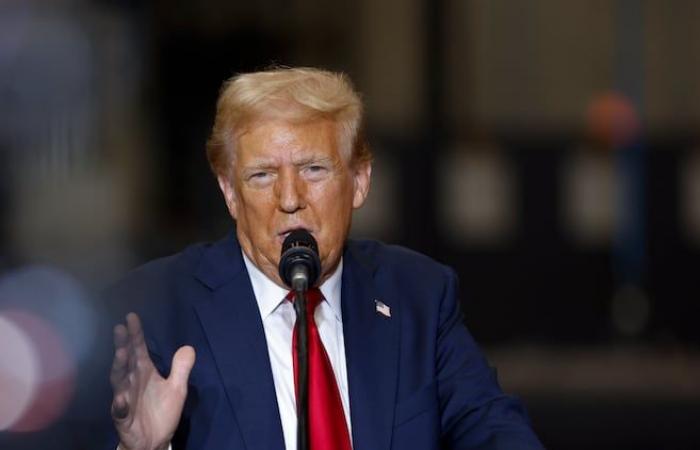Friday’s action, coupled with sanctions and rewards for information leading to the capture of the accused hackers, is the latest effort by the U.S. government to denounce what is seen as Iran’s attempts to interfere in the election by damaging Mr. Trump and sowing general chaos.
“The defendants’ own words made clear they were attempting to undermine former President Trump’s campaign ahead of the 2024 U.S. presidential election. We know that Iran continues its brazen efforts to stoke discord, erode trust in the American electoral process and further its malicious activities,” Attorney General Merrick Garland said at a news conference announcing the charges.
All three accused hackers were employed by Iran’s paramilitary Revolutionary Guard, which cybersecurity analysts had previously linked to the intrusions. Since 2020, their operation aimed to compromise the email accounts of a wide range of targets, including a former ambassador to Israel, a former deputy director of the CIA, officials from the State and Defense departments, a former advisor U.S. Homeland Security and journalists, according to the indictment.
In May, prosecutors say, the defendants began trying to penetrate the Trump campaign, successfully breaking into the email accounts of campaign officials and other allies of Donald Trump. They then sought to “weaponize” the stolen campaign materials by releasing them to media organizations and individuals associated with President Joe Biden’s campaign in what is colloquially referred to as a “hack and leak” operation.
U.S. intelligence agencies said Iran opposed the Republican candidate’s re-election, seeing him as more likely to increase tensions between Washington and Tehran. The Trump administration ended a nuclear deal with Iran, reimposed sanctions and ordered the assassination of Iranian Gen. Qassem Soleimani, an act that prompted Iranian leaders to vow revenge.
Iran’s mission to the United Nations last month denied the allegations, calling them “baseless,” saying Iran had neither the motive nor the intention to interfere in the election. She challenged the United States to provide evidence and said that if the United States did so, “we would respond accordingly.”
Distribution of sensitive documents
The U.S. government has sought through multiple agencies this year to vigorously condemn election interference and foreign influence operations — a stark reversal from the government’s response in 2016, when U.S. officials he Obama administration have been criticized for not being upfront about the Russian interference they observed in favor of Donald Trump while he was running against Democrat Hillary Clinton.
The Treasury Department issued sanctions Friday related to the hack and the State Department offered rewards of up to US$10 million ($13.5 million) for information leading to the arrest of the defendants, who are not in detention.
The Iranian hack came to light after Trump’s campaign team announced on August 10 that it had been hacked and that Iranian actors had stolen and distributed sensitive internal documents.
Many major news organizations that have said they received confidential information from the Trump campaign team, including Politico, the New York Times and the Washington Postrefused to publish them.
U.S. intelligence officials later linked Iran to a hack of Trump’s campaign team and an attempted hack of Joe Biden and Kamala Harris’ campaign team. They said the hacking operation was intended to sow discord, exploit divisions within American society and potentially influence the outcome of the election, which Iran perceives to be “particularly consequential in terms of impact they could have on its national security interests.
The indictment makes clear that the accused hackers posed as U.S. officials and created fake email profiles to try to dupe their victims.
Politico reported that it began receiving emails on July 22 from an anonymous account. The source — an AOL email account identified only as “Robert” — forwarded what appeared to be a research brief the campaign had apparently conducted on Republican vice presidential nominee, Ohio Sen. J.D. Vance. The document was dated February 23, nearly five months before Mr. Trump chose Mr. Vance as his running mate.
The Biden campaign also hacked
Last week, officials also revealed that the Iranians sent unsolicited emails containing excerpts of the hacked information to people associated with the Biden campaign in late June and early July. None of the recipients responded.
Harris’ campaign team said the emails looked like spam or a phishing attempt and condemned the Iranians’ move as “unwanted and unacceptable malicious activity.”
One of the emails was sent on June 27, the date of the Biden-Trump debate, when a faltering performance by the president laid the groundwork for his announcement, weeks later, that he would not run again. An email offering the stolen information, according to the indictment, indicated that the debate was likely Mr. Biden’s “last chance” in the race.
The author expressed negative feelings toward Donald Trump and wrote, “So I am going to forward to you some documents that would be helpful in defeating him.”






